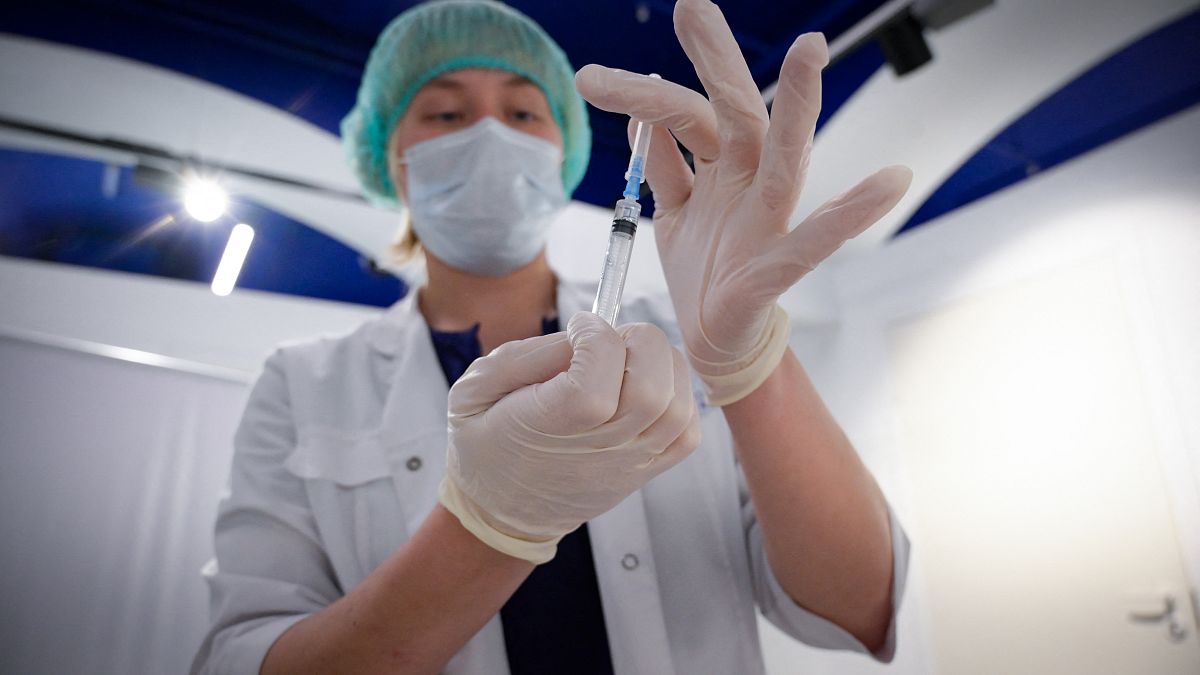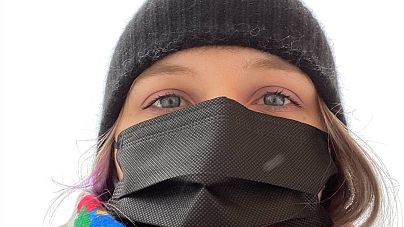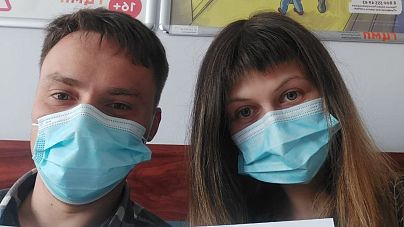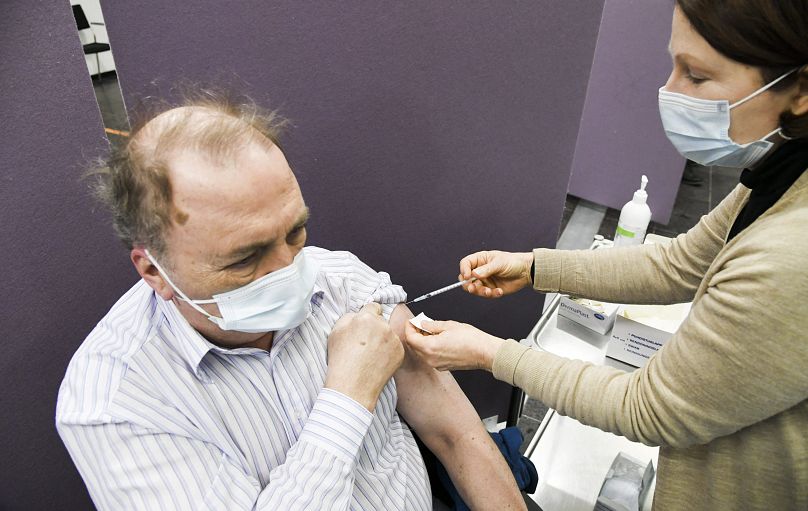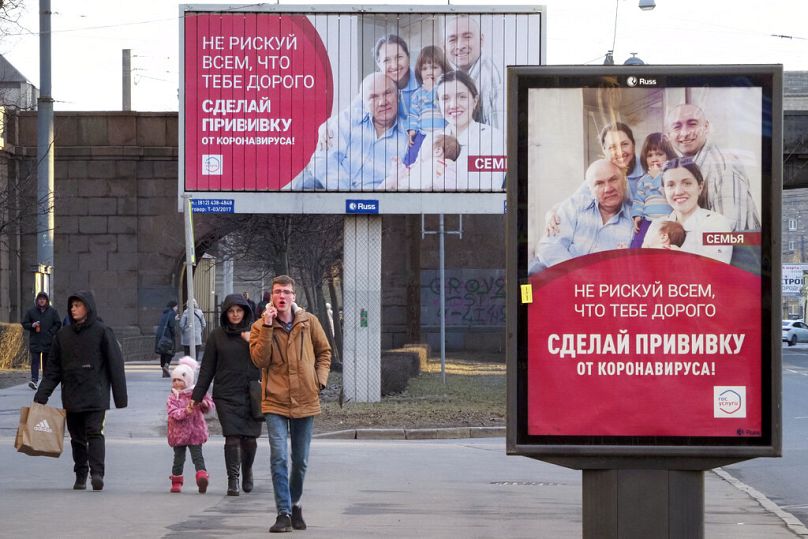Faced with a long wait for a COVID vaccine, some younger Russians living in Finland have been travelling over the border for the Sputnik V jab.
Faced with a long wait for a COVID vaccine, younger people living in Finland have been travelling over the border to Russia for the Sputnik V jab.
While there are no official figures on how many have been doing this, a slow start to Finland's vaccine rollout -- due to wider supply problems experienced across the EU - and low take-up in Russia are thought to have fuelled the trend.
Tatiana Deribina is 28 years old and generally healthy. She had been waiting for her invitation to get vaccinated in Helsinki, where she lives and works as an IT solution architect. When that wasn't forthcoming she decided to travel to Russia.
Her Russian passport entitles her to get the vaccine free - foreigners can pay to be vaccinated at private clinics.
The only other hurdles for Tatiana was some paperwork and a 400-kilometre trip.
“I was planning on visiting my grandmother in Russia anyway," Tatiana explained. "She is 88 years old. By having the vaccine, I wanted to protect myself and her.”
She had her first shot in St. Petersburg in late March, and by the end of April, she was fully vaccinated against COVID-19.
“I know that I still have to disinfect my hands and wear a mask. Nevertheless, it calms me down knowing that I’m immunised,” she said, adding, that “if people at my workplace get sick, I will still be able to work”.
Dmitry Kurnosov and his wife, both Russian nationals in their 30s living in Finland, recently returned from St. Petersburg after getting their second shot of Sputnik V.
“It was easy to sign up online. There were hundreds of slots available,” said Dmitry.
In connection with Dmitry’s job as a researcher at Helsinki University, the couple will be going to Russia during the summer, and they wanted to make sure they were fully vaccinated before travelling.
“If we would have been offered the vaccination in Finland already this spring, it wouldn’t have made sense to go to Russia to get it,” he said.
It is unclear how many people are travelling from Finland to Russia to get vaccinated.
Euronews asked the Finnish border guard, the Finnish embassy in Moscow, the consulate in St. Petersburg and several Russian associations and academics for an estimate - without success.
According to Statistics Finland, close to 29,000 people in Finland have Russian citizenship. Russian is the native language of more than 84,000 Finnish residents - or 1.5% of the population.
Many people in the Russian-speaking community in Finland know of someone who has crossed the eastern border for a vaccination.
Paula Tiittala from the Finnish health ministry said it is “positive that citizens are willing to have a corona vaccination”.
“If a person wants to use health services in other countries, they can do so,” said Tiittala, while emphasising that the foreign ministry recommends avoiding all non-essential travel to Russia.
Dmitry called the decision to go to Russia to get vaccinated, a “complicated calculation."
Despite the travel recommendations “when you have relatives abroad, it is hard to stick to this advice,” he said.
Tatiana does not feel bad about it either.
“I haven’t seen my family for a year,” she explained. “I know it’s no excuse, but at least now it is possible to go. At some point, the borders were closed and I couldn’t go at all. Russia has opened for travel from Finland, so I was allowed to go and come back.”
“You could also view it from a different perspective,” Tatiana suggested. “I basically only had one really risky trip - the first one to Russia. After that, I had done something to ease the situation by having a vaccination.”
Higher risk of contracting COVID-19 in Russia
In Russia, authorities have reported 44 COVID-19 cases per 100,000 inhabitants in the last seven days.
Though vaccinations are crucial for getting over the pandemic, the risk of catching the coronavirus while in Russia far outweighs the benefits of getting the vaccination a little quicker, said professor of infectious diseases Asko Järvinen from Helsinki University Hospital.
“There might be a benefit on the personal level,” Järvinen admitted. “But as a whole, the risk of contracting the coronavirus on a trip to for example in St. Petersburg - where the COVID-19 situation has been much worse than in Finland - is very high.”
The Russian vaccine, named Sputnik V, is an adenovirus viral vector vaccine, using similar technology as the Oxford-AstraZeneca vaccine.
The Gamaleya Research Institute, which developed the vaccine, published results showing 95% efficacy in The Lancet in February. But since then, scientists have raised concerns about the validity of the data, raising questions about the effectiveness of the vaccine.
That hasn’t stopped a number of people from seeking out Sputnik V.
Steady but slow rollout in Finland
Finland’s current COVID-19 situation is improving. In week 21 (May 24 – 30) Finnish authorities reported 16 cases per 100,000 residents.
More than half of Finland’s adult population has been given at least one COVID vaccination, among the highest in the EU by this measure.
However, only around 10% have been given two shots to get them fully vaccinated - among the lowest percentage of people in EU countries. That's in part because the country has prioritised getting one dose in as many people as possible.
Many countries recommend having the two necessary COVID vaccines of Pfizer-BioNTech, Moderna and AstraZeneca within a 3-4 week interval. Finland is giving them at a 8-12 week interval.
“The longer gap between doses will rapidly help increase vaccine coverage in a serious epidemic situation, meaning more doses in small consignments are available to more people,” said Hanna Nohynek chief physician at the Finnish Institute for Health and Welfare in a press release in February.
Back then, Finland was challenged by a limited vaccine supply. Although more vaccines are now being shipped to the country, the intervals for the Moderna and Pfizer-BioNTech vaccines are not likely to be shortened. At least not until every willing Finnish resident above the age of 16 has had at least one jab.
“Someone who is vaccinated usually gets better protection when the interval between doses is extended because that way, the immunity produced by the body matures and gains strength,” Nohynek stated.
Studies from Britain, where the same strategy has been used, shows that a 12-week interval might strengthen antibody responses - at least for some age groups and some vaccines.
The Finnish Ministry of Social Affairs and Health said they are satisfied with vaccine progress.
“The COVID-19-vaccination rollout has progressed well in Finland in comparison with Europe as well as in a global comparison,” senior medical officer Paula Tiittala from the ministry told Euronews via e-mail.
“The vaccination order has been specified by a government decree, and the vaccinations have advanced so that the elderly population and people belonging to risk groups have already had the opportunity to have the vaccine.”
At the current pace, most Finnish residents below the age of 30 will be offered the first vaccine dose in late June or July, and - due to uncertain vaccine deliveries - it might take until the end of the year to be fully vaccinated, the health ministry informed.
For some, that is too long to wait.
Coronavirus scepticism in Russia
Dmitry also talked about scepticism towards the coronavirus epidemic and the Russian vaccination against it.
“My personal experience is that many Russians are dismissive of the coronavirus. They don’t see it as a threat, and many are sceptical of the vaccine” said Dmitry, who has lived in Finland for less than a year.
“I am not only talking about people with low education or income, some academics also think this way. To me, this is striking!”
One of the reasons Dmitry and his wife decided to go to Russia for the vaccination, was to set an example.
“This is a collective effort. If this only concerned me, I would feel more relaxed. Now I wish that our extended family and circle of friends would get vaccinated too.”
Tatiana Deribina talked about an experience in the waiting room of a hospital in St. Petersburg: “I met a man, who asked me what I was doing there. When I told him that I was coming in for the vaccination, he asked me, ‘why would you do that? Aren’t you afraid.?’I have to admit that I got all kinds of thoughts, such as ‘what if I’m being chipped?’,” Tatiana smiled.
Her 88-year-old grandmother has not had the Sputnik vaccine and has no intentions to have it.
“She says that she has not had a vaccine her entire life, and is concerned about how she would react to it,” Tatiana explained.
Russians unwilling to take their own vaccine
While Finland has a limited supply of vaccines and a population eager to be vaccinated, Russia has the opposite problem.
According to the site gogov.ru, which follows Russia’s COVID vaccine rollout, close to 12% of adults in Russia have had at least one vaccine dose and almost 9% of the adult population is fully vaccinated. So there are still plenty of unvaccinated Russians.
Studies have shown that COVID vaccine hesitation in Russia is as high as 62%, said Margarita Zavadskaya, a postdoctoral researcher at the Finnish Centre for Russian and East European Studies - the Aleksanteri Institute - at the University of Helsinki.
There are different reasons for the hesitation she said. Some distrust anything from the government, while others trust the Russian Sputnik V vaccine, but not that it is necessarily transported, handled and given correctly. And then, there are also just people, who are traditional anti-vaxxers as we know them from elsewhere: people generally opposing vaccination.
“The main explanation is, however, an extremely low level of trust in political institutions and authorities,” said Zavadskaya.
With a heavy legacy from Soviet times and recent optimisation reforms, some local hospitals have been closed; and there is a lack of funding in the health sector with outdated equipment.
“Russian health care institutions are in an obsolete state, and COVID-19 has exacerbated existing problems,” explained Zavadskaya.
Many Russians are not flocking to get a COVID shot because they’re not concerned about the virus. Surveys show that 38% of Russians think that the whole virus is a hoax. The central administration in Moscow has generally been hesitant to impose nationwide restrictions in order to reduce the spread of the virus. Instead, President Vladimir Putin has for the most part delegated the COVID response to the regions, which is very unusual in today’s highly centralised Russia, Zavadskaya noted.
“This is Putin’s way of keeping himself out of the political blame game if things go wrong,” she deemed.
